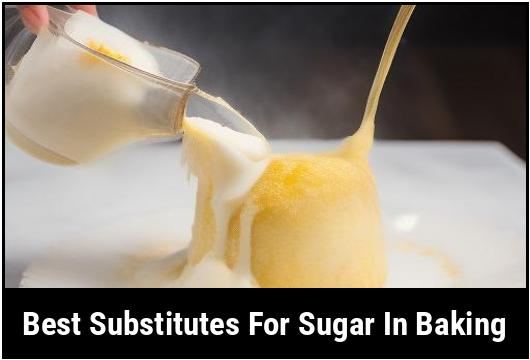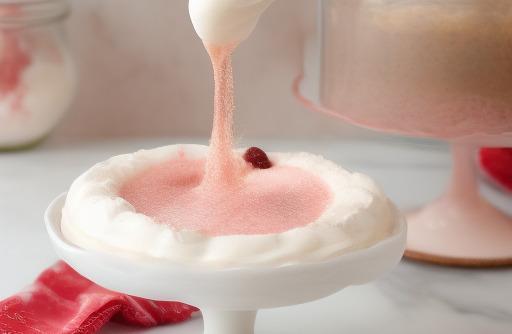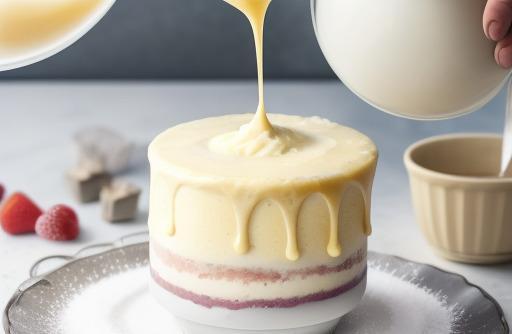- You are here:
- Home »
- Food Substitutes
- » Best Substitutes For Sugar In Baking
Best Substitutes For Sugar In Baking

Baking is a delightful and rewarding activity that brings joy to many. However, traditional baking recipes often call for large amounts of sugar, which can have negative effects on our health when consumed in excess. Fortunately, there are a plethora of alternatives available that can be used as a substitute for sugar in baking without compromising taste or texture.
In this comprehensive guide, we will explore the various types of substitutes for sugar in baking, the best options available, tips for choosing the right substitute, and even provide some delicious recipes to try. So, whether you are looking to reduce your sugar intake or have dietary restrictions, read on to discover the best substitutes for sugar in baking.
Key Takeaways
- Excessive consumption of sugar can have negative effects on our health.
- There are various alternatives that can be used as substitutes for sugar in baking.
- Some popular options include honey, maple syrup, coconut sugar, and stevia.
- Each substitute may have unique flavor profiles and may require adjustments to the recipe.
- Choosing the right substitute depends on personal preferences and dietary restrictions.
Why You Need A Substitute For Sugar In Baking
Sugar is a common ingredient in baking that contributes to the taste, texture, and appearance of the final product. However, consistently consuming high amounts of sugar is associated with various health concerns, such as obesity, diabetes, and heart disease. Therefore, it becomes essential to find healthier alternatives that can be used as substitutes for sugar in baking.
Using substitutes allows you to reduce the overall sugar content in your baked goods while still enjoying the sweet flavors that make them so enjoyable. Additionally, using alternatives to sugar can benefit those with dietary restrictions, such as individuals following a low-carb or diabetic diet.
Types Of Substitutes For Sugar In Baking

When it comes to substituting sugar in baking, there are numerous options available. Let’s explore some of the most popular types of substitutes:
1. Honey
Honey is a natural sweetener produced by bees from nectar. It is an excellent substitute for sugar in baking due to its natural sweetness and ability to retain moisture. Honey has a distinct flavor that can complement certain baked goods, such as bread and muffins. It also has a higher sweetness level than sugar, so using a smaller amount is often sufficient.
2. Maple Syrup
Maple syrup is another natural sweetener that can be used as a sugar substitute in baking. It is made from the sap of maple trees and offers a unique flavor profile. Maple syrup adds a rich, caramel-like taste to baked goods, making it perfect for desserts like pies, cakes, and cookies. However, it is important to note that maple syrup is liquid in nature and may require recipe adjustments to maintain the desired consistency.
3. Coconut Sugar
Coconut sugar is a popular alternative sweetener derived from the sap of coconut palm trees. It has a similar texture and appearance to brown sugar but with a subtle caramel flavor. Coconut sugar is slightly less sweet than regular sugar, so using a slightly larger amount may be necessary. It works well in most baking recipes and is particularly suitable for dishes like cookies, brownies, and bars.
4. Stevia
Stevia is a natural sweetener extracted from the leaves of the stevia plant. It is incredibly low in calories and has a high sweetness level, making it a popular choice for those looking to reduce their sugar intake. Stevia is available in both powdered and liquid form, and a small amount goes a long way. It is important to note that stevia can have a slightly bitter aftertaste, so it may not be suitable for all recipes.
5. Fruit Puree
Fruit puree, such as applesauce or mashed bananas, can be used as a sugar substitute in certain baked goods. These purees add natural sweetness and moisture to the recipe. Applesauce works well in cakes, muffins, and bread, while mashed bananas are ideal for cookies and brownies. When using fruit puree as a substitute, it is essential to reduce the amount of liquid in the recipe accordingly.
It is important to note that each substitute may affect the taste, texture, and appearance of the final product. Therefore, experimentation and adjustments may be necessary to achieve the desired results.
Best Substitutes For Sugar In Baking
Now that we have explored the various types of substitutes available, let’s dive into the best options for replacing sugar in baking:
1. Erythritol
Erythritol is a sugar alcohol that has become increasingly popular as a sugar substitute in recent years. It is a naturally occurring compound found in certain fruits and fermented foods. Erythritol looks and tastes similar to sugar, making it an excellent option for baking. It has zero calories and does not spike blood sugar levels, making it suitable for individuals on a low-carbohydrate or diabetic diet. However, it is important to note that erythritol may have a cooling sensation when consumed in large quantities.
2. Xylitol
Xylitol is another sugar alcohol that can be used as a substitute for sugar in baking. It has a similar sweetness level to sugar and a granulated texture. Xylitol has fewer calories than sugar and is known to have dental benefits, as it inhibits the growth of bacteria in the mouth that can lead to tooth decay. However, xylitol can have a laxative effect when consumed in large amounts, so it is important to use it in moderation.
3. Monk Fruit Sweetener
Monk fruit sweetener is derived from the extract of the monk fruit, a small melon-like fruit native to China and Thailand. It is incredibly sweet, with a flavor profile similar to sugar. Monk fruit sweetener contains zero calories and does not raise blood sugar levels, making it a suitable substitute for individuals with diabetes or those following a low-carb diet. However, monk fruit sweetener can be quite expensive compared to other substitutes.
4. Agave Nectar
Agave nectar is a natural sweetener extracted from the sap of the agave plant. It is similar in consistency to honey and has a mild, neutral taste. Agave nectar has a lower glycemic index than sugar, meaning it has a lesser impact on blood sugar levels. However, it is important to note that agave nectar is higher in fructose than other sweeteners and should be used in moderation.
Choosing The Right Substitute For Sugar In Baking
When selecting a substitute for sugar in baking, there are a few factors to consider. Here are some tips to help you choose the right substitute for your needs:
-
Flavor Profile: Consider the flavor profile of the substitute and how it will complement your recipe. Some substitutes, like honey and maple syrup, have distinct flavors that can enhance certain baked goods, while others, like erythritol and xylitol, have a more neutral taste.
-
Texture and Consistency: Consider the texture and consistency of the substitute. For example, liquid alternatives like honey and maple syrup may require adjustments to the recipe to maintain the desired texture.
-
Sweetness Level: Determine the sweetness level of the substitute and adjust the quantity accordingly. Some substitutes, like stevia and monk fruit sweetener, are much sweeter than sugar, so a smaller amount may be needed.
-
Dietary Restrictions: Take into account any dietary restrictions or preferences you may have. If you are following a low-carb or diabetic diet, options like erythritol and stevia may be more suitable.
-
Availability and Cost: Consider the availability and cost of the substitute. Some alternatives may be more readily available and affordable than others.
Cooking With Substitutes For Sugar In Baking

When using substitutes for sugar in baking, it is important to be aware that they can behave differently than sugar in recipes. Here are some tips to help you achieve the best results:
-
Experiment and Adjust: Baking is a science, and substituting sugar can affect the texture and structure of the final product. It may require some trial and error to find the perfect substitute for your recipe. Start by substituting a portion of the sugar and gradually increase or decrease based on your preference.
-
Measure Properly: When measuring a substitute, follow the recommended conversion guidelines. Keep in mind that some substitutes are sweeter than sugar, so using a smaller amount may be necessary.
-
Consider Texture and Moisture: Substitutes like fruit puree, honey, and maple syrup can add moisture to baked goods. Adjust the recipe accordingly by reducing the amount of liquid or increasing the amount of dry ingredients.
-
Combine Substitutes: For a more balanced flavor and texture, consider combining different substitutes. For example, using a combination of erythritol and stevia can help overcome the aftertaste associated with stevia.
-
Baking Time and Temperature: Some substitutes may affect the baking time and temperature. Pay attention to the texture and appearance of your baked goods and adjust the timing if needed.
Pro Tip: If you are substituting sugar with a liquid alternative, such as honey or maple syrup, reduce the overall liquid in the recipe by approximately 1/4 cup for every cup of sugar replaced. This will help maintain the desired texture and consistency.
Recipes Using Substitutes For Sugar In Baking
Ready to try some delicious recipes using substitutes for sugar in baking? Here are a few ideas to get you started:
1. Banana Muffins With Stevia
-
Ingredients:
- 2 ripe bananas, mashed
- 1/2 cup unsweetened applesauce
- 1/4 cup melted coconut oil
- 1 teaspoon vanilla extract
- 2 eggs, beaten
- 1 1/2 cups flour
- 1/2 teaspoon baking soda
- 1/2 teaspoon baking powder
- 1/2 teaspoon salt
- 1/2 teaspoon stevia powder
-
Instructions:
- Preheat the oven to 350°F (175°C). Line a muffin tin with paper liners.
- In a large bowl, combine the mashed bananas, applesauce, coconut oil, vanilla extract, and beaten eggs. Mix well.
- In a separate bowl, whisk together the flour, baking soda, baking powder, salt, and stevia powder.
- Gradually add the dry ingredients to the wet ingredients, stirring just until combined.
- Fill each muffin cup 3/4 full with the batter.
- Bake for 18-20 minutes or until a toothpick inserted into the center comes out clean.
- Allow the muffins to cool in the tin for a few minutes, then transfer them to a wire rack to cool completely.
2. Chocolate Chip Cookies With Coconut Sugar
-
Ingredients:
- 1 cup unsalted butter, softened
- 1 cup coconut sugar
- 2 large eggs
- 2 teaspoons vanilla extract
- 3 cups all-purpose flour
- 1 teaspoon baking soda
- 1/2 teaspoon salt
- 1 1/2 cups chocolate chips
-
Instructions:
- Preheat the oven to 350°F (175°C). Line a baking sheet with parchment paper.
- In a large bowl, cream together the softened butter and coconut sugar until light and fluffy.
- Add the eggs one at a time, beating well after each addition. Stir in the vanilla extract.
- In a separate bowl, whisk together the flour, baking soda, and salt.
- Gradually add the dry ingredients to the wet ingredients, mixing just until combined.
- Stir in the chocolate chips.
- Drop rounded tablespoonfuls of dough onto the prepared baking sheet, spacing them about 2 inches apart.
- Bake for 10-12 minutes or until the edges are lightly golden.
- Allow the cookies to cool on the baking sheet for a few minutes, then transfer them to a wire rack to cool completely.
Feel free to experiment with different substitutes and adaptations to suit your taste preferences and dietary needs.
Storage And Shelf Life Of Substitutes
It is important to note that some substitutes for sugar in baking may have a shorter shelf life than sugar itself. Here are some guidelines for storing common sugar substitutes:
- Honey: Store honey in a cool, dark place at room temperature. Properly sealed honey can last indefinitely, but it may crystallize over time. To liquefy crystallized honey, place the jar in warm water and stir until smooth.
- Maple Syrup: Keep maple syrup refrigerated after opening. It can last for up to one year when stored properly.
- Coconut Sugar: Store coconut sugar in an airtight container in a cool, dry place. It can last for up to one year.
- Stevia: Most stevia products have a long shelf life and can last for several years when stored in a cool, dry place.
- Erythritol, Xylitol, and Monk Fruit Sweetener: These sugar substitutes have a long shelf life and can last for several years when stored properly.
Always check the packaging for specific storage instructions and use-by dates.
Conclusion
Substituting sugar in baking is an excellent way to reduce your sugar intake and accommodate dietary restrictions while still enjoying delicious homemade treats. With a wide variety of options available, including honey, maple syrup, coconut sugar, stevia, and fruit puree, you can easily find a substitute that suits your taste preferences and health goals.
When selecting a substitute, remember to consider factors such as flavor profile, texture, sweetness level, and dietary restrictions. Experimentation and adjustments may be necessary to achieve the desired results, but with some creativity and practice, you can create healthy and enjoyable baked goods without the excessive sugar.
So, next time you find yourself in the kitchen, don’t hesitate to explore the world of sugar substitutes and whip up some delightful treats that are both delicious and nourishing. Happy baking!
FAQS
What Are Some Low-calorie Sweeteners That Can Be Used As A Substitute For Sugar In Baking?
Some good low-calorie alternatives for sugar in baking are stevia, erythritol, and monk fruit sweetener. These sweeteners have a similar level of sweetness as sugar and can be used in similar quantities in recipes.
Can Honey Be Used As A Substitute For Sugar In Baking?
Yes, honey can be used as a substitute for sugar in baking. It is sweeter than sugar, so you would need to use less of it in recipes. Honey also adds a distinct flavor to baked goods, so it may not be suitable for all recipes.
Are There Any Fruit-based Sweeteners That Can Be Used In Baking?
Yes, there are several fruit-based sweeteners that can be used as a substitute for sugar in baking. Dates, raisins, and pureed fruits like applesauce and bananas can all add natural sweetness and moisture to baked goods.
What Is The Best Substitute For Brown Sugar In Baking?
The best substitute for brown sugar in baking is a combination of molasses and white granulated sugar. To make it, add 1 tablespoon of molasses to 1 cup of white sugar and mix well. This will give you the same level of sweetness and flavor as brown sugar.
Can Artificial Sweeteners Be Used In Baking?
Yes, artificial sweeteners can be used in baking, but they may not work in all recipes. Some artificial sweeteners like aspartame and saccharin lose their sweetness when heated, so they are not a good choice for baked goods. Others, like sucralose and acesulfame potassium, can be used in baking with good results. It’s important to follow the manufacturer’s guidelines for using artificial sweeteners in recipes.
Sources
About the Author Jenny
I'm Jenny, a housewife with an unwavering passion for food. My culinary journey began with my grandmother's kitchen, and it's now a full-fledged food blog. I've turned my love for cooking into a creative outlet, sharing recipes and stories with a global community of fellow food enthusiasts. It's proof that being a housewife can also mean pursuing your passions and savoring life's delectable moments.
